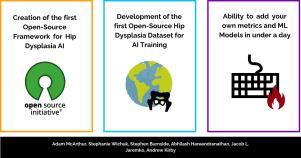Retuve: Automated multi-modality analysis of hip dysplasia with open source AI
IF 1.2
Q3 COMPUTER SCIENCE, SOFTWARE ENGINEERING
引用次数: 0
Abstract
Developmental dysplasia of the hip (DDH) poses significant diagnostic challenges, hindering timely intervention. Current screening methodologies lack standardization, and AI-driven studies suffer from reproducibility issues due to limited data and code availability. To address these limitations, we introduce Retuve, an open-source framework for multi-modality DDH analysis, encompassing both ultrasound (US) and X-ray imaging. Retuve provides a complete and reproducible workflow, offering open datasets comprising expert-annotated US and X-ray images, pre-trained models with training code and weights, and a user-friendly Python Application Programming Interface (API). The framework integrates segmentation and landmark detection models, enabling automated measurement of key diagnostic parameters such as the alpha angle and acetabular index. By adhering to open-source principles, Retuve promotes transparency, collaboration, and accessibility in DDH research. This framework can democratize DDH screening, facilitate early diagnosis, and improve patient outcomes by enabling widespread screening and early intervention. The GitHub repository/code can be found here: https://github.com/radoss-org/retuve

回报:使用开源AI对髋关节发育不良进行自动化多模态分析
发育性髋关节发育不良(DDH)提出了重大的诊断挑战,阻碍了及时干预。目前的筛选方法缺乏标准化,并且由于数据和代码可用性有限,人工智能驱动的研究存在可重复性问题。为了解决这些限制,我们介绍了Retuve,一个多模态DDH分析的开源框架,包括超声(US)和x射线成像。Retuve提供了一个完整且可重复的工作流程,提供开放数据集,包括专家注释的美国和x射线图像,带有训练代码和权重的预训练模型,以及用户友好的Python应用程序编程接口(API)。该框架集成了分割和地标检测模型,能够自动测量关键诊断参数,如α角和髋臼指数。通过坚持开源原则,Retuve促进了DDH研究的透明度、协作性和可访问性。该框架可以使DDH筛查大众化,促进早期诊断,并通过广泛筛查和早期干预改善患者预后。GitHub存储库/代码可以在这里找到:https://github.com/radoss-org/retuve
本文章由计算机程序翻译,如有差异,请以英文原文为准。
求助全文
约1分钟内获得全文
求助全文

 求助内容:
求助内容: 应助结果提醒方式:
应助结果提醒方式:


